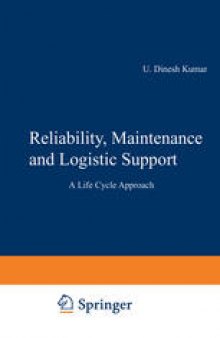 جزییات کتاب
جزییات کتاب
Reliability, Maintainability, and Supportability play a crucial role in achieving a competitive product. While manufacturing costs are important for the success of a product, they are not the sole domains in realizing its competitive edge. Improved manufacturing and operating quality and performance coupled with reduced acquisition cost and in-service cost of ownership are important in achieving business success. It is the early phase of design which offers the greatest opportunity to address these requirements, and thus create life cycle effectiveness. The main objective of Reliability, Maintenance and Logistic Support -A Life Cycle Approach is to provide an integrated approach to reliability, maintainability, maintenance and logistic support analysis. We not only look at the ways we can improve the design process to ensure the product offers value for money, but we also consider how the owners can get the most from these products once they have entered service. The approach provides a meaningful way of integrating reliability, maintenance and supportability to enhance the product performance and sales opportunities. Hence, the book covers the following objectives: (1) Introduce the concepts of reliability, maintainability and supportability and their role in the system life cycle and effectiveness. (2) Introduce the basic probability and statistical techniques that are essential for modelling reliability, maintainability and supportability problems. (3) Introduce reliability measures: how to predict them; how to determine from in-service real-world data; how to use them. (4) Analysis of advanced models in Reliability. (5) Discuss basic and advanced concepts in both maintainability and maintenance including preventive, corrective and condition based maintenance. (6) Discuss maintenance management and optimization concepts, such as reliability-centered maintenance and age-related maintenance. (7) Provide basic concepts in supportability and Integrated logistic support. (8) Discuss techniques for design for reliability, maintainability and supportability. (9) Analysis of simple and advanced models in spares forecasting and optimization. (10) Discuss data analysis, data management and data mining techniques.



 دانلود کتاب
دانلود کتاب

 جزییات کتاب
جزییات کتاب





 این کتاب رو مطالعه کردید؟ نظر شما چیست؟
این کتاب رو مطالعه کردید؟ نظر شما چیست؟
